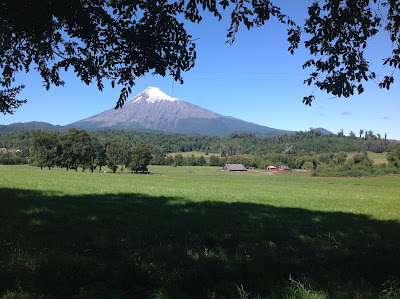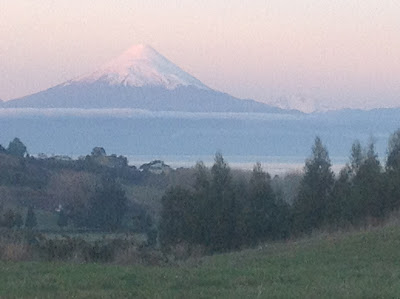I have been getting a lot more emails the past few months from people interested in moving to Chile so I thought I would share some of the questions with my responses here for you.
what made you go to Chile??
Well, this is what we were looking for
Stable government
Growing economy
Safe
A place where we didn't stick out as the rich gringos
Moderate climate not too dry or too cold or too hot
We went to Uruguay and it was nice but not too impressive
We had friends here in Chile from the USA who owned a vacation home which they let us use for 2 years until we found our farm
Funny thing is they didn't like Chile and are now back in the USA.
How are the school systems in your area?
Public school is the pits but there are private schools - some free like the catholic school my kids attend. Public schools in my experience have problems controlling the students. Their ideas on discipline and control are a bit different than in the US. The teachers teach to the yearly exit exams mandatory for each grade and text books are revisionist history written by the socialists. Students are not taught to think but just how to follow the steps to achieve the correct answer. All schools have english teachers as there is a big push to get all chileans speaking english but in my opinion they don't start soon enough because most kids graduate not being able to speak english.
How bad are the mosquitoes? Any fear of getting one of the fevers?
Despite the fact that this area is a temperate rainforest (the Valdivian rainforest) mosquitos and other insects are not really a big problem like in Maine, Minnesota, or Canada.
Remember Chile is not tropical or jungley. It is nowhere near the Amazon so we don't have any of the tropical fevers and diseases you may find in Ecuador or Brazil. Chile is very modern, clean, and healthy. You can drink the water anywhere with no fears. The US State Dept does not have any warnings for travelers to get any immunizations before coming here.
Are there wood burning stoves instead of central heating?
Wood burning stoves are very common or propane heaters. Central heat is very unusual.
Are the locals welcoming at all or do they not want us there?
Locals love us. They think America is great (little do they know!) In the area we live, the Los Lagos region, in 1860 it was settled by thousands of german families so we fit in and most people who don't know us just think we are colonial germans. In places like Ecuador and Peru, you will be targeted as a "rich" American but not here. Chileans are friendly and helpful. My kids had an almost superstar status when they joined our little local school as they had never had american students before.
My hope is to get a job teaching English as a foreign language does that actually sound like a possibility in a not so populated area?
If you want a job teaching in a school, you may need to be certified but I don't know how that works but make sure you have all your documents (look up my article on my blog entitled "Don't leave home without it" and I have a list of all the documents you may need and how to have them apostilled.
We have friends who teach english but it's not in a public school and they seem to live in the cities (Santiago & Puerto Montt). You can do some research on Facebook or online for schools that teach english in Chile. Many businesses that don't have a website often use Facebook for advertising.
There's a course for TEFL (teaching English as a foreign language) but it's only in Santiago I can't find it anywhere south.
Is there lactose free milk or a dairy alternative? my son is lactose intolerant
Chile has dairy companies that produce lactose free milk and yogurt and are found in most larger supermarkets. Lider (walmart) and Jumbo have the best selection of products and the imported (expensive) products from the US. My friend found a new product at Jumbo made in Chile called Nature's Heart Almond Vanilla drink with no sugar. There are more products available in Santiago than here but things are moving and changing here so eventually we should have most products! Also Jumbo has lactose free cheeses.
What is the safest and best way to transfer funds from America to Chile?
As far as money, we use our ATM and debit card everywhere without a problem though ATM fees can be quite hefty. For large sums of money, you can use Western Union or XE.com
Are there any stores for things to get for kids like toys?
Yes, they have toys here :) but anything imported from America is super expensive.
In your opinion what town is best for someone that prefers the cold but also wants the ocean and forest? (Haha so basically I'm being too picky)
No - that is one of the great things about Chile! Because the country is only 150 miles wide, more or less, You can easily be in the mountains, the forest, and the beach in one afternoon. We prefer green areas as opposed to the dry dusty arid regions around Santiago. We don't like snow and prefer the year round mild temps of the Los Lagos region. 40 F in winter and 60-70F in summer. We don't like cities so we live out in the country but if you need a job you could live somewhere near Valdivia or Osorno. I'm not as familiar with the other regions.
My husband was wondering besides English teaching, what jobs are there for Americans there that aren't super fluent in Spanish just yet?
Jobs are a difficulty here if you don't speak good spanish so start working on it now! Lots of good online programs. Starting a business here or online are options. Though starting one here won't be easy and you need to be here for a while to figure out what you can do or to fill a need you may find. Tourism is big here and cabin rentals and farming. A hands-on trade like plumbing or electrical work may be a good business as Americans are trusted here and have better knowledge of these fields.
Here are a few tips for you-
You will need some income or savings while you are getting established. If you live simply, you could make it for a year on $20-30,000 USD
Chile is not one of the cheaper places in SA to live.
We keep our expenses down by living simply like chileans and homesteading to produce a lot of our own needs. We sell pigs and pork and vegies to supplement our monthly annuity income.


